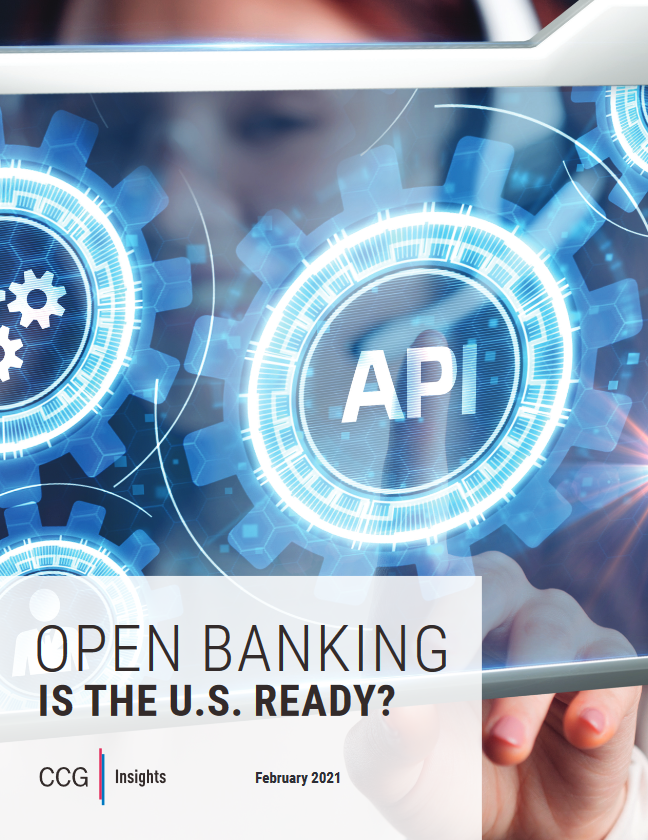Merging Banking and Fintech: 3 Ways to Drive Value & Deeper Integration within Commercial Banking
Available On Demand – 18 minutes
Join the CCG team for a fireside chat with host Scarlett Sieber and industry veteran Joe Spatarella discussing the ways that fintech can help to drive value and deeper integration within commercial banking.
Commercial online banking is dependent on access to perishable digital data and transaction systems. As internal bank integrations become more extensible, commercial customers will be able to consume data and interact with bank applications. This integrated banking process begins with file-based processing and leads us to API banking and Banking as a Service (BaaS).
Subscribe to CCG Insights.
[restrict]
Scarlett Sieber Hello and welcome back to CCG Webcast. I am your host, Scarlett Sieber, Managing Director, Chief Strategy and Innovation Officer here at CCG Catalyst. And this is our fourth episode within our commercial digital banking series. So again, I am joined by my incredible colleague, Joe Spatarella, who is an industry veteran and Managing Director here at CCG Catalyst. I can’t believe we’re already four episodes into this topic of commercial banking. This could be one hundred episodes with all of the content that we could potentially be talking about here. So, Joe, thank you again so much for being here with me today. And I’m looking forward to diving into this topic with you.
Joe Spatarella Hi, Scarlett. This should be an interesting conversation. And hopefully our viewers will get a lot of insight from our discussion.
Scarlett Sieber Absolutely. So, before we get into what we’re going to be talking about this week, let me do some quick housekeeping. So, as always, if you look at the bottom of your screen, you will see a few buttons at the bottom. The first is the video where you are seeing Joe and I present to you right now. You then next have your slide buttons. If you look a little bit over, you will see an icon of Joe and my face together. If you go ahead and click on that, you will get access to our full bios and backgrounds. You will be able to contact us via email, via LinkedIn, you can find me on Twitter. And then the next button over is the CCG logo. That is your go-to resource place. You can connect with us, go to our website. We will put some of the latest and greatest content and articles there. So again, you’ll see a link, an article that Joe wrote again about what’s happening within commercial banking. And if you have any questions, you can also use that Q&A. You’ll be happy to answer you or email us directly, whatever you prefer, we are here for you. So, this week we’re going to be looking at merging banking and fintech. You all know how much I care about this topic. I am so excited that I have a colleague who cares just as much as I do. And we’re hoping that you leave this conversation with three ways to drive value in deeper integration on the commercial banking side, of course. As many of you know, I certainly have more of the consumer banking background, but I have dabbled on the commercial side. So, Joe, a lot of people are interested in this broader topic of fintech and banking coming together. It’s certainly not a new topic, we’ve been looking at this for years. APIs, open banking, there is a lot of activity, especially on the consumer side. We’re still in the early days of commercial. What does that look like from your perspective?
Joe Spatarella Yeah, that’s a great question and one of the interesting area Scarlett. Right now I think our industry as a whole, particularly in talking about treasury management, cash management, is kind of at a turning point. If you think about it, the ideal that we’ve talked about, the future state, if you will, is that there should be a secure automated link between financial institutions and commercial customers pushing data and information and transactions back and forth between bank processing systems and accounts receivable, accounts payable, general ledger. And really, the user interface and user experience, whether it be through web or mobile, would really be more around what we’ll call exceptions or what we’ll refer to as OnDemand transactions. So if you think about that, we can then delve into what’s the underlying technology there. And a lot of it is about, as you alluded to, API, open banking, some even call it banking as a service. And in order to get there, a lot of folks are talking about fintech partnerships. And it’s a curious one because, it’s gone between fintechs and banks being sort of adversarial, competitive and then cooperating with each other. Where we are in commercial banking, from my perspective, is we’re still in an early adopter stage. There are those that are making investments, but they too, even the technology providers are partnering with those fintechs that are providing API infrastructure in order to push out additional services. But you’ll see a lot of white papers, a lot of discussions, but not necessarily a lot of services. So far we’re seeing a limited number of banks deploying commercial APIs and I’m sure that number will continue to grow as we move from waves to wave. But the real philosophical question is, why would a financial institution partner with a fintech? And there’s a couple of reasons. One time to market, we’re always faced with the build versus buy decision, but the real question is, how long does it take? What’s the window of opportunity and how do you get products to clients? So that’s the first thing. The second thing is that fintechs have done a lot more innovation, they’re a lot more agile, they can move much quicker, and they can adapt those innovations to the bank specific need. And really, the third thing to look at is the management of risk. In working with fintechs and some of them being startup or post startup phase, there is an element of risk there, both financial and performance. That’s where we see our role as CCG Consulting acting more as an agent to help manage those fintech relationships. But all of those things combined is what’s going to push us forward into this new business model for information and transaction exchange. That is actually being really driven forward by the current Covid-19 situation where everything is about remote and distant and suddenly digital commercial banking is becoming not a convenience, but an absolute necessity. So I think really to frame the conversation, we need to look at, what are the opportunities, what are the benefits, and what are the risks?
Scarlett Sieber I have so many comments on that aspect. Historically in my roles, being the internal advocate for the fintechs, I certainly think you hit on a few of the key reasons why these relationships make sense and I believe there are a lot more as well. Now sitting on the other side of the desk, so to speak, when you’re sitting there in these big financial institutions, you see the complacency and I’m not trying to say in a negative way, but you get used to doing the same things over and over and you’re very siloed and you’re focused on one specific thing, whereas fintechs have this autonomous, agility and flexibility to just go try things, test things, get real feedback immediately. They don’t have the same rules and regulations, of course they should, and there are aspects that they do, but when they’re getting started, they have a lot more freedom to really go and get these things out. And like you said, the open APIs and the banking aspect is certainly something that is very close to me. If you look down at the CCG logo, you will see a link as well to a recent article that I wrote in Financial Brand really around is now finally open banking’s time in the United States. I used to work for a Spanish bank, so obviously there’s been a lot of development over in Europe, and even in 2015, I was exploring this here in the United States with BBVA. So real quickly, before we kind of start getting into the deeper integration aspects of commercial banking and the impact of fintech there, let me ask you a question. Why do you think, you and I have talked about this off-line many times, why do you think that the consumer side from an API perspective, is so far advanced compared to where we are in commercial? Why aren’t we further along on the commercial side?
Joe Spatarella Sure. Well, based on my experience in the industry, it’s always the case that consumer goes first with technology because simply stated, it’s a very direct relationship, it’s a one to one relationship. There are simple transactions. As you move into the commercial space, small business, middle market, and then commercial and corporate, what you’re faced with is entitlements that can be very granular. Multiple entities, multiple complex relationships. So, it becomes a lot more challenging when it’s not a one to one relationship but a one to many or many to many type relationship, so it’s not uncommon. We’ve seen that in a lot of different waves of technology over the last thirty years. I think too as you move into commercial, and you alluded to this earlier Scarlett, there are government regulations and oversight that the banks have to be sensitive to and tremendous compliance requirements and audit requirements. So, again, fintech isn’t necessarily bound by all of that. So, there is a very delicate balance here in terms of how do you leverage their agility but make it work inside of a heavily regulated industry.
Scarlett Sieber Totally agree there. So, let’s start diving a level deeper here. Can a commercial entity be linked to a bank or opening account process system? If it’s done in a secure and safe manner, of course, is it possible for them to do that?
Joe Spatarella The short answer is yes. However, the connection is never going to be a direct one. Obviously, that would open up all types of security, audit and compliance considerations. It certainly speaks to the safe and secure aspect to the question. So API or open banking or banking service is all supported by an API infrastructure or middle-ware that’s going to authenticate inbound requests and control transactions based on the originating user entitlements. Obviously the authentication is key from a security standpoint, the entitlements are key from a control perspective. Once the security entitlements are validated, any number of requests, transactions, responses can be processed in an automated fashion.
Scarlett Sieber That makes sense. One conversation I’ve certainly had with a fair amount of banks, it’s an ongoing conversation, is the need for a kind of a central portal. So, if connectivity is required for several bank applications at once, is there really a need for a central portal to support a single access point? And what does that look like?
Joe Spatarella Again, I think from a client experience perspective, the simple answer is yes. However, it depends on each bank or credit unions’ technology infrastructure and framework. They may opt to leverage an existing portal or they may create something very specific for API connection points. Some of the things, as you know, that are rolled out is really making APIs available to third parties to be able to create those connection points, but then driving them through a central point of access. So I think until we get a little bit further on in terms of adoption, we’re not going to see, a de facto approach to this, I think you’ll see some that are decentralized and some that are centralized.
Scarlett Sieber Will companies specific connectivity require the use of multiple protocols and file formats? What do you think about that?
Joe Spatarella That’s a great question because that is always a challenge with data communications. The ideal is to move away from a bilateral, meaning the FI to the commercial customer arrangement and adopt industry standards. Now, that’s always a challenge. They’re in process now. And as we like to say, the great thing about standards are so many to choose from. That would relate to connectivity and data formats. So, the question is, who sets that? Does the industry set those standards? Do the banks set those standards? Does the customer dictate what they need to be? And again, I think this is going to evolve over time.
Scarlett Sieber In your mind, who should be setting those standards?
Joe Spatarella The ideal is that the industry set those standards, but that always takes way more time than anyone’s willing to wait. So typically what happens is you’ll see a little bit of each. You’ll see some of the larger institutions dictating their customers if you want to do this, these are the standards you need to use. You’ll see larger commercial customers or corporate customers saying if you want us to do it with you, these are the standards you need to use. And over time, the industry standards will evolve. Things like ISO 20022 standards are generally being adopted both on the technology side and on the banking side. I think from a data standpoint, that might be an easier way to go in terms of how the technical, the basic communications take place, I think that might settle into a particular track. But again, it’s early days.
Scarlett Sieber So we’ve talked a bit about APIs as we opened this conversation, do you think that API banking only appeals to large corporate clients?
Joe Spatarella No. As a matter of fact, a lot of small, medium sized businesses are also looking for better meaning faster and more efficient, integration to their finance and accounting software. And they’ve got access to a lot of the same software now, because of cloud processing. So it’s not just for the upper ends of the market, it has a lot more applicability, even right down to the very small businesses.
Scarlett Sieber I agree with you, and I certainly have seen some interesting applications going much, much smaller down that funnel. So there is so much here and we could be talking about fintech/bank mergers forever, not referring to formal merger, just merging of minds and capabilities. I certainly have my perspective and I’m curious from yours, how would a financial institution, whether be a banker or a credit union, how do they identify viable fintech partners specifically for them?
Joe Spatarella Sure. I think in some cases they may have lending relationships with some if they happen to be in that space. But for the most part, I think this is where CCG Catalyst Consulting can certainly add value by assisting with documenting requirements, identifying what we would consider to be qualified fintech partners, and managing those partnerships because we understand the technology side, we understand the fintech side and we understand the banking applications as well. I think that would help to mitigate the risk and to help realize all of the potential benefits.
Scarlett Sieber I certainly agree. Joe we are out of time for this episode. I can already see blog posts and podcasts coming out this conversation because my mind is spinning right now on what we discussed and the best ways to move forward. So thank you all again for joining. As I mentioned to you in the beginning, if you have questions, please go ahead. You can use the Q&A portal below. If we don’t get to your question right now, we will contact you directly afterwards. You can also email us or connect with us on LinkedIn directly to answer questions, whatever you’re comfortable with. We are happy with whatever works for you, we are great with. And if you are interested in discussing your digital product and technology strategy, you want to have a brief conversation to say, Hey, where do I start? What does this look like? Please let us know. We are here as resources for you. We love this stuff. We talk about it all the time. Or if you have suggestions on what else you want to hear from us and hear our opinions about anything as it relates to this, please do let us know. Use the different platforms that we’ve made available to you. We are so excited for the future of the space. I personally as a big open API and open banking fan am excited to see what’s going to happen on the commercial side, that’s an area I’ve been away from for a while. So Joe, I know you’re going to be one of the crusaders on that and I’m looking forward to seeing where we go. All right. Well, thank you all so much, enjoy the rest of your day. And until we see you next time. Stay safe. And we look forward to the conversation again.
[/restrict]
Business Continuity: Unlocking Digital Commercial Banking Capabilities
Financial Brand Article: Is It Finally Time for Open Banking’s Debut in America?
Digital Dreams – Expanding Commercial Banking Capabilities
Financial Brand Article: Over the COVID Horizon, Mobile Banking Demands Strategic Clarity
Chief Strategy & Innovation Officer Scarlett Sieber is one of the world’s premier voices in financial services. She is among the industry’s most sought-after speakers as a thought leader and innovator with expertise in driving organizational change at both startups and enterprises across the financial services and fintech ecosystem. Scarlett has been invited to speak at over 100 prestigious financial services and technology conferences globally, including Money20/20, Finovate, South Summit, and NASA’s Cross Industry Innovation Summit.
Scarlett’s experience includes founding her own startup as well as working at banks such as BBVA, USAA, and Opus Bank. She is a leading fintech influencer, included on lists such as Top 100 Women in Fintech 2019 and Top 10 Fintech Influencers in the U.S. Scarlett also has deep experience in digital strategy and innovation implementation, making her a key asset to building cutting-edge programs for our clients.
Managing Director Joe Spatarella brings more than 30 years of experience in Commercial Banking, Treasury Management, Payments and Financial Technology. Joe has been, and continues to be, at the forefront of successful new digital banking strategies and products. He has a proven track record of leveraging emerging technologies and developing successful go-to-market strategies for financial institutions. Joe’s career started in bank operations and commercial product management. He has a multi-dimensional view of the business with a thorough understanding of sales, marketing, product, operations and technology components, along with the ability to communicate issues and opportunities with a clear, concise and forward-looking perspective.









